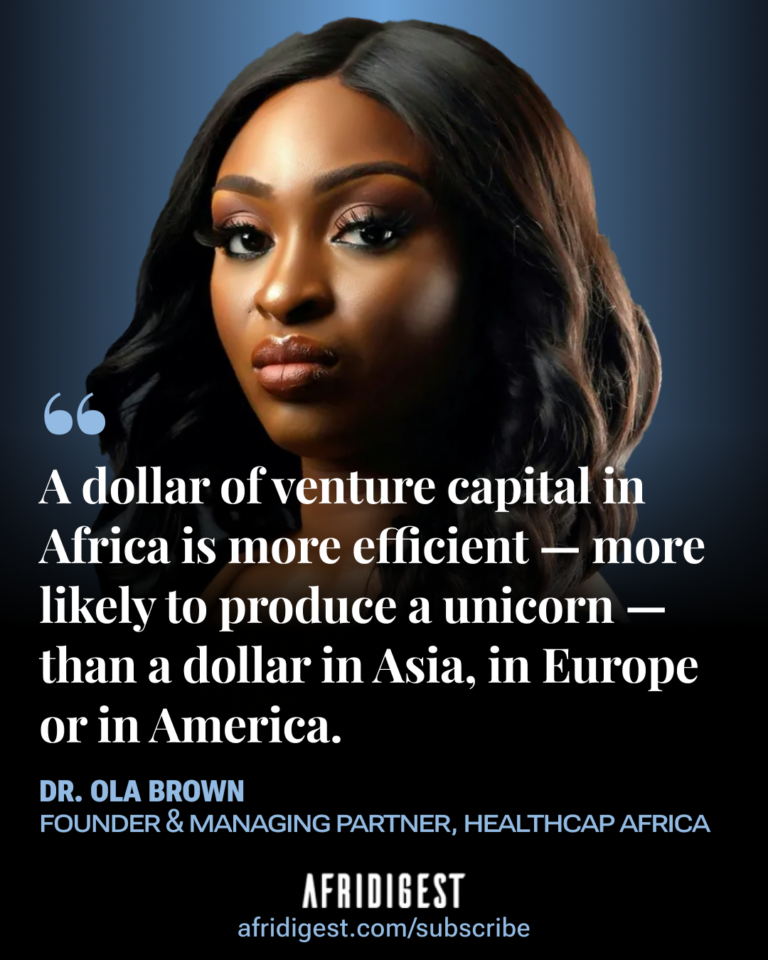Global investors have a massive blind spot.
“A dollar of venture capital in Africa is more efficient — more likely to produce a unicorn — than a dollar in Asia, in Europe, or in America.”

That’s Dr. Ola Brown, Founder & Managing Partner of Lagos-based VC firm Healthcap Africa, challenging assumptions about where venture capital delivers the best returns.
While receiving significantly less venture funding than counterparts in more established ecosystems, African startups as a whole have demonstrated remarkable capital efficiency in producing unicorns — private tech companies valued at over $1 billion.
This efficiency advantage stems from several factors, including:
- Massive underserved markets with high growth potential
- Founders building fundamental solutions for pressing problems rather than nice-to-have improvements
- Lower operational and customer acquisition costs at scale
The results speak for themselves.
Africa’s nine current unicorns include Nigeria’s Flutterwave, Egypt’s MNT-Halan, Senegal’s Wave, and South Africa’s Tyme — transformative businesses that have reached billion-dollar valuations while raising significantly less capital than their global counterparts.
For instance, Flutterwave reached unicorn status after raising ~$225 million, a fraction of what comparable, newly-minted fintech unicorns raised in other markets.
Dr. Brown’s analysis quantifies this efficiency: “By measuring unicorns produced per dollar of venture capital per capita, Africa emerges as arguably the most capital-efficient tech ecosystem in the world.”
Her calculations (using 2023/2024 data) suggest Africa is ~2 times more efficient at producing high-value startups relative to total venture capital dollars invested compared to the US and Europe:
- Africa: 9 unicorns, ~$3.20 VC per capita = ~2.81 unicorns per $1 of VC per capita
- USA: ~600 unicorns, ~$424 VC per capita = ~1.42 unicorns per $1 of VC per capita
- Europe: ~125 unicorns, ~$80 VC per capita = ~1.56 unicorns per $1 of VC per capita
And notably, eight of Africa’s nine unicorns are fintechs solving fundamental financial infrastructure and/or inclusion challenges.
“There’s not a single big company in Africa that was created to solve boredom in terms of our tech industry. And that’s what makes [it] quite unique,” Dr. Brown argues, contrasting foundational 10x innovation on the continent with more incremental innovation seen in Silicon Valley and elsewhere.
Yet despite this efficiency advantage, Africa continues to receive a disproportionately small share of global venture capital — less than 1% according to most estimates, despite being home to approximately ~18% of the global population.
The disconnect between capital efficiency and capital allocation suggests a significant opportunity for global investors willing to look beyond traditional markets to explore Africa’s burgeoning innovation economy.
Dr. Brown draws parallels to investing in America a century ago: “European investors had to navigate perceived risks and logistical complexities, but those who took the leap made outsized returns. [Africa is] now at a similar inflection point.”
With demographic tailwinds (Africa will account for the majority of global population growth to 2050), technological leapfrogging (e.g., the continent skipped landlines for mobile, traditional banking for mobile money), and improving economic fundamentals, the foundation for sustained venture capital returns appears increasingly robust.
What’s your take?
- Do you find Africa’s efficiency in unicorns created per venture dollar compelling? Or are there other metrics you’d point to instead?
- What would it take to shift more global institutional capital toward African startups if the efficiency advantage is real?
- How might the focus on solving foundational vs. incremental challenges impact the long-term trajectory of the continent’s tech ecosystems?
Join the conversation on Linkedin.
—
Dr. Brown brings unique perspective as both founder and investor. Before leading HealthCap Africa, she founded Flying Doctors Nigeria, gaining firsthand experience scaling a tech-enabled healthcare business across the continent. Her investment portfolio at GreenTree Investment Company (which she co-founded before HealthCap) achieved impressive returns, including a 25% IRR and a successful exit when portfolio company Paystack was acquired by Stripe. This practical experience informs her view that African startups aren’t just more capital efficient by chance — they’re solving fundamental infrastructure problems that, when addressed, unlock massive value.





Share: